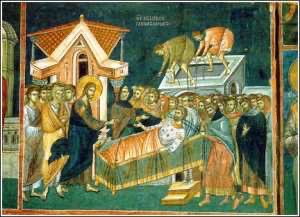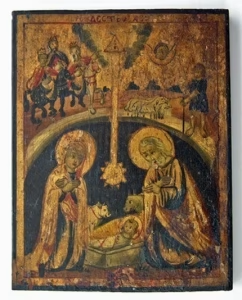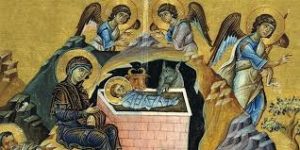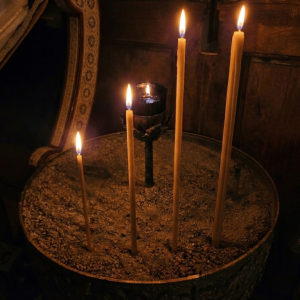Sermon on the Sixth Sunday after Pentecost: the Paralytic.
By Archbishop Andrei Rymarenko, spiritual father of Saint Philaret the Confessor of ROCOR.

Thank you, Brother Michael!
The Gospel reading of last Sunday told us how the Gadarenes went out to meet Jesus and how they asked Him to “depart out of their coasts.” And this happened because all of them were infected with one sin, the passion for profit, the love of money. This was an insatiable thirst for wealth, more and more of it. And wealth came to them through large herds of swine which were grazing in their pastures. But according to Jewish Law, they had no right to keep them. In this was their sin, and they lived in sin, to satisfy only this passion, this idol of getting rich. And this passion seemed to unite them all. See how the Gospel says,
“And, behold, the whole city came out to meet Jesus and…besought Him that He would depart out of their coasts” (Mt. 8:34).
Yet not all inhabitants of this town were bad people. Undoubtedly, among them were those who wanted to see Jesus, who wanted to listen to His teaching, and maybe were ready to believe in Him. Salvation was so close, so very close. But this idol, this passion for profit enslaved them; and instead of asking the Lord to remain in their town, they asked Him to go away. They were already deprived of their freedom of will; through sin they were enslaved, a spiritual paralysis possessed them. The Gospel continues, “And He entered into a ship, and passed over, and came into His own city.
And, behold, they brought to Him a paralytic, lying on a bed: and Jesus seeing their faith said unto the paralytic; Son, be of good cheer; thy sins be forgiven thee” (Mt. 9:1-2).
There is physical paralysis, but there is also spiritual paralysis. Being paralyzed physically we want to do something, but either our hand or our foot does not move. But being spiritually paralyzed even to think is difficult, and we don’t want to do anything — we lose heart. There is a desire to fulfill a commandment of Christ, and yet we cannot; something is interfering, something is holding us back.
And instead of Christ abiding in our heart — there is a storm, and Christ goes away.
What motivated the Gadarenes to ask Christ to leave their land? Sin — the passion for profit. And this sin brought them into spiritual paralysis, and they did not have enough spiritual fortitude to detain Christ with them.
So it happens to us. The only reason is sin. And sin is not only love of money. There is a whole variety of rays from this “black diamond.” This means laziness, pride, vain talking, lying, condemnation, gluttony, anger, irritability, cruelty, any kind of impurity, despondency and still more and more. And we all suffer from these sins: whoever has any of these, this is sin. And this is what brings us to spiritual weakness, to spiritual paralysis. Let us look within ourselves and let us honestly recognize that, like the Gadarenes, we all live in spiritual weakness, in spiritual paralysis. But let us not despond. The Gospel today gives us great comfort. With what words does Christ heal the paralytic? “Thy sins be forgiven thee.” This means that in bodily paralysis, also, the reason is often sin. And in spiritual paralysis, sin is always the reason. All you have to do is find this sin, this passion which stands between us and Christ; take it to the Lord and say: “Lord, heal me!”
Then the Lord will tell us as He did the paralytic: “Thy sins be forgiven thee…. Arise, take up thy bed and go unto thine house” (Mt. 9:5-6).
And the storm will calm down, will go away from the heart, and Christ will fill it with quiet joy. The weakness will disappear and a new energy will appear in us, a new life in Christ Jesus our Lord.





